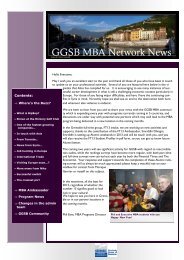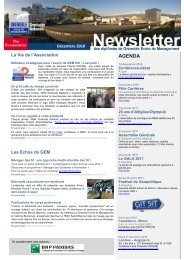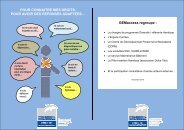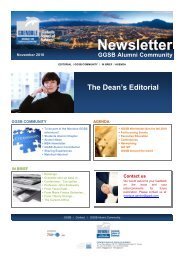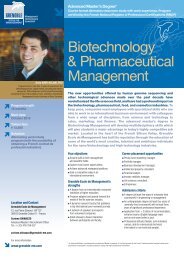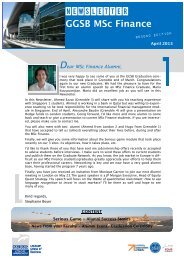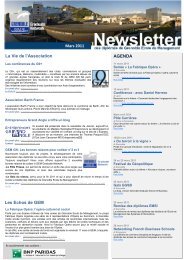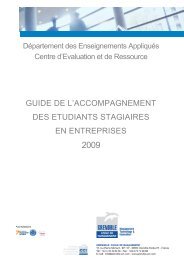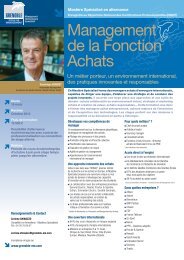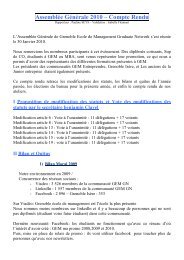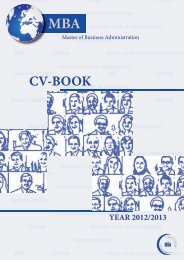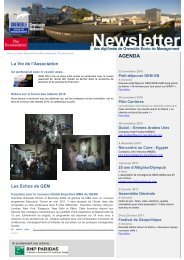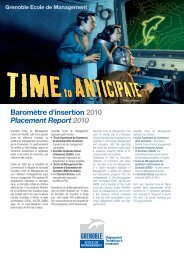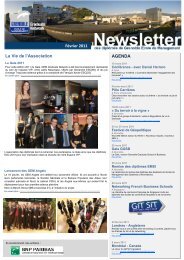Download the PDF version - Grenoble Ecole de Management
Download the PDF version - Grenoble Ecole de Management
Download the PDF version - Grenoble Ecole de Management
You also want an ePaper? Increase the reach of your titles
YUMPU automatically turns print PDFs into web optimized ePapers that Google loves.
exercise was to learn what we nee<strong>de</strong>d to learn from o<strong>the</strong>r business school with comparable standing as ours, without<br />
compromising on our own i<strong>de</strong>ntity and image. Ano<strong>the</strong>r very important stakehol<strong>de</strong>r group that we inclu<strong>de</strong>d in this<br />
reflective exercise was <strong>the</strong> local and international companies that have been employing our graduates for <strong>the</strong> past<br />
several years. As part of <strong>the</strong> first Professional Advisory Board organized by GGSB this year, local and international<br />
companies were invited to provi<strong>de</strong> us feedback on all <strong>the</strong> GGSB programs. The Professional Advisory Board also<br />
inclu<strong>de</strong>d some of our alumni, who contributed in a big way towards <strong>the</strong> reflections pertaining to <strong>the</strong> revision of <strong>the</strong> MIB<br />
program. This feedback was <strong>the</strong>n used to enrich our reflections during <strong>the</strong> MIB review process. Once we had received<br />
all <strong>the</strong> input from <strong>the</strong> different aca<strong>de</strong>mic <strong>de</strong>partments and once <strong>the</strong> input from <strong>the</strong> o<strong>the</strong>r stakehol<strong>de</strong>rs was also<br />
presented to <strong>the</strong> MIB program review committee, <strong>the</strong> creative process of restructuring <strong>the</strong> program commenced. The<br />
MIB program review committee met five times through <strong>the</strong> year, every time engaging in in-<strong>de</strong>pth reflections and<br />
discussions, which culminated in <strong>the</strong> generation of many creative suggestions regarding <strong>the</strong> content of <strong>the</strong> program.<br />
This iterative and reflective exercise conclu<strong>de</strong>d with <strong>the</strong> final presentation and subsequent approval of <strong>the</strong> revised MIB<br />
program to <strong>the</strong> GGSB Board of Studies in June 2011. The current MIB stu<strong>de</strong>nts were also invited to comment on <strong>the</strong><br />
revised program and have given it <strong>the</strong>ir resounding approval!<br />
The revised MIB program is a much leaner and richer program than <strong>the</strong> existing one and more in line with <strong>the</strong> current<br />
<strong>de</strong>mands of <strong>the</strong> job market. The review process has resulted in shortening some of <strong>the</strong> existing modules (for example,<br />
International Business Law), regrouping o<strong>the</strong>r existing modules ( for example, Research Methodology for FMP and<br />
Business Statistics have been regrouped into a more coherent module entitled Research Methodology for<br />
International Managers), creation of many new modules (for example Marketing and Innovations and Strategic<br />
Marketing and Planning) and <strong>the</strong> integration of existing modules into o<strong>the</strong>r modules (for example, Economics is now<br />
part of <strong>the</strong> larger International Business module). In <strong>the</strong> revised MIB program <strong>the</strong> Final <strong>Management</strong> Project<br />
(graduating <strong>the</strong>sis) has been given much more significance as compared to <strong>the</strong> existing program. This change is in<br />
line with <strong>the</strong> general practices in many top business schools around <strong>the</strong> globe. Most importantly, all <strong>the</strong>se changes are<br />
consistent with <strong>the</strong> gui<strong>de</strong>lines provi<strong>de</strong>d by our accrediting bodies (AMBA, EQUIS and AACSB).<br />
The revised MIB program is set to be launched in September 2012. The MIB program team and <strong>the</strong> entire GGSB<br />
family as well as our advisors and well-wishers are holding <strong>the</strong>ir breaths to see <strong>the</strong> impact of <strong>the</strong> interesting and<br />
collaborative work we have done this year! We are confi<strong>de</strong>nt that <strong>the</strong> revised MIB program will be even more<br />
successful than <strong>the</strong> current program. Inputs from our alumni with regards to <strong>the</strong> revised MIB program are very<br />
welcome!<br />
Dr. Taran Patel has lived and worked in several countries including France, Spain, India, Finland and <strong>the</strong> UK. In addition to being<br />
an Associate Professor in <strong>the</strong> <strong>Management</strong> and Organizational Behaviour Department of <strong>Grenoble</strong> <strong>Ecole</strong> <strong>de</strong> <strong>Management</strong>, she is<br />
also <strong>the</strong> Director of <strong>the</strong> Masters of International Business (MIB) Program of GGSB. Additionally, she is a Visiting Scholar at <strong>the</strong><br />
University of Oxford and Affiliate Researcher at <strong>the</strong> Judge Institute, Cambridge where she does research in <strong>the</strong> area of crosscultural<br />
management, corporate sustainability reporting practices and <strong>the</strong> culture of innovations. She has published aca<strong>de</strong>mic<br />
articles in many internationally recognized peer-reviewed journals: Innovations: A European Journal of Social Sciences,<br />
<strong>Management</strong> Decisions, Journal of Business Ethics etc. Her book entitled ‘Stereotypes of Intercultural <strong>Management</strong>’ was published<br />
in 2007 and was <strong>the</strong> culmination of her doctoral <strong>the</strong>sis, which won <strong>the</strong> EFMD (European Foundation for <strong>Management</strong> Development)<br />
Award for best doctoral <strong>the</strong>sis in <strong>the</strong> Corporate Governance category in 2006. She has been a consultant to companies such as<br />
Salmson in France and Technip-Coflexip in India. She has been involved in diversity training programs with companies such as<br />
Atos Origin and AXA. Her initiatives in creating awareness regarding Diversity <strong>Management</strong> were recognized when she was invited<br />
as a speaker at <strong>the</strong> World Diversity Lea<strong>de</strong>rship Summit at <strong>the</strong> United Nations Headquarters in New York in 2007<br />
The M3C Mo<strong>de</strong>l of Cooperative Contextual Change<br />
Dr. Mark Esposito and Dr. Lloyd C. Williams from <strong>Grenoble</strong> Graduate School of Business<br />
in France, jointly with Dr. Alessandro Biscaccianti, have come toge<strong>the</strong>r to write a mo<strong>de</strong>rn<br />
new textbook on <strong>the</strong> <strong>the</strong>ory of contextual change, presenting original i<strong>de</strong>as tested and<br />
ready to implement in <strong>the</strong>ir highly informative book, The M3C Mo<strong>de</strong>l of Cooperative<br />
Contextual Change.<br />
The book has been released worldwi<strong>de</strong> on May 17 th and it sold out, in few days in <strong>the</strong> UK. The<br />
work is now being used at Harvard, where Dr. Mark Esposito teaches, to enhance parts of <strong>the</strong><br />
systems dynamics course, where stu<strong>de</strong>nts from around <strong>the</strong> world are participating.<br />
On July 20 th <strong>the</strong>n, Dr. Mark Esposito and Dr. Lloyd Williams have animated and co-lectured on<br />
<strong>the</strong> content of <strong>the</strong> book at Harvard University, in a crow<strong>de</strong>d Emerson 108 Hall.<br />
The authors posit that to increase effectiveness of change, it's necessary to introduce dynamic stability into a system.<br />
The whole organization and each individual should have a sense of security, and M3C can become <strong>the</strong> vehicle for this<br />
change. One especially new element is <strong>the</strong> contextual “drivership” method, which integrates lea<strong>de</strong>rship and<br />
management into organizational practices and processes that assure opportunity and capacity for success among<br />
employees.



